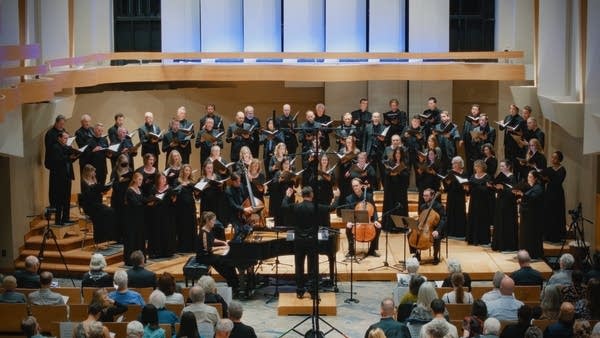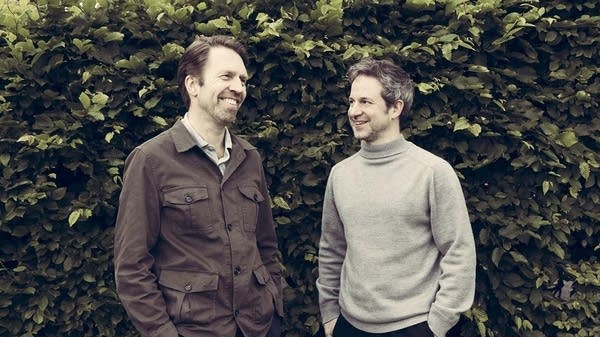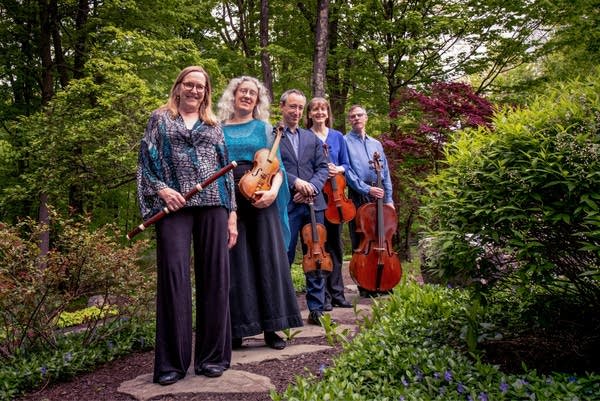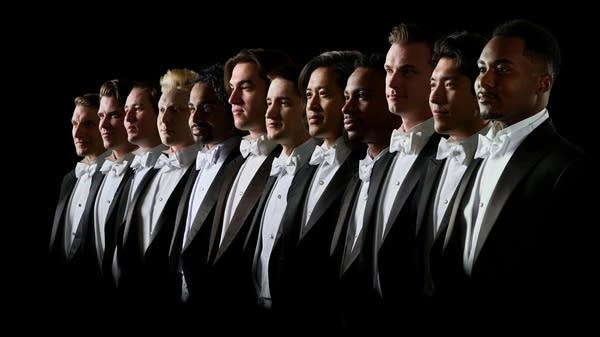Christopher Tin & Royal Philharmonic Orchestra: To Shiver the Sky (Universal)
If you're familiar with composer Christopher Tin, it may be because he made history as the first composer to win a Grammy Award for music written for a video game.
"The song that I wrote a Grammy for is called Baba Yetu, and it's actually a choral setting of the Lord's Prayer in Swahili. And it was originally written for the video game Civilization IV which is a very legendary franchise in the gaming world. In 2009, I rerecorded the song and released it on my debut album, Calling All Dawns. So six years after the song was brought to the world — in this form of a video game theme — is when it was finally honored as as a Grammy winning song."
The Royal Philharmonic Orchestra was featured on that Grammy-winning song, and they're collaborating with Christopher once again on his latest solo recording, To Shiver the Sky. It's a grand production featuring three choirs and two opera stars: soprano Danielle de Niese and tenor Pene Pati.
"I had an idea early on that I wanted to do an oratorio based on the history of mankind's quest to fly. The history of aviation, from Da Vinci's notebooks and the legend of Daedalus and Icarus all the way through John F. Kennedy declaring that we would be putting a man on the moon by the decade's end. And this started because, once again, I had written a theme song for a video game. In this case, it was Civilization VI. And that song became a bit of a hit.
And so I took that song, repackaged it, rerecorded it, wrote 10 other movements around it, and found a way to basically tell the story of aviation through the words of those who actually helped propel it forward.
The piece that was the origin for this oratorio was called Sogno di Volare and it was from the video game Civilization VI and it's the first track on the new oratorio. And it's also the main theme in that it's a recurring musical motif that comes back again and again across the course of the album. Anytime humanity suffers defeat or failure or setbacks, the dream of flight theme comes back and summons us back to that cockpit, back on our feet to to try to push forward to achieve our dream of flying."
One of the pieces that really caught my ear was Astronomy. It starts quietly, in polish with words by Capernicus. It's also kind of comforting, too.
"It was in this sort of spirit of comfort, of beholding the beauty of the cosmos and sort of reveling in it, that I thought, I want this particular piece to sound. I want it to sound peaceful and calm and tranquil, but give you the impression that you are gazing at the stars and the splendor of the universe.
"If you were actually to look at the sheet music, I have actually drawn in — using notes played by the orchestra — the various constellations that relate to flight. So, Phoenix, Draco the dragon, Cygnus, the Swan... If you were to draw lines between the note heads on the conductor score, and we actually even created a little video that's on my YouTube channel to show just where these constellations just sort of magically appear in the music."
That finale We Choose to Go to the Moon, is so powerful, and I have to tell you — and this is a compliment — it reminded me of a big Disney tune.
"So this idea that the moon landing could only have happened because people were already attuned to this idea through science fiction and so forth, was very much on my mind when I was composing We choose to Go to the Moon. And so a lot of aspects of it do sound like they could come from, say, you know, a Star Trek movie, you know, or something like that."
When Neil Armstrong actually stepped foot on the moon, I mean, the entire eyes of the world were fixated on this one event. We did this thing where we defied our earthly bonds and we touched the face of God. And part of me really longs for the world to experience something like that again. A unifying moment that pulls together people of all countries and all cultures, into this sort of unified belief that humanity is something special. And when we put our heads together, we can achieve great things."
To Shiver the Sky, a new oratorio celebrating the history of aviation from Christopher Tin.
To hear the rest of my conversation, click on the extended interview above, or download the extended podcast on iTunes or wherever you get your podcasts.
Resources
Christopher Tin
— To Shiver the Sky (Amazon)
Christopher Tin (official site)
Love the music?
Show your support by making a gift to YourClassical.
Each day, we’re here for you with thoughtful streams that set the tone for your day – not to mention the stories and programs that inspire you to new discovery and help you explore the music you love.
YourClassical is available for free, because we are listener-supported public media. Take a moment to make your gift today.
Your Donation
About New Classical Tracks®
Host Julie Amacher provides an in-depth exploration of a new classical music release each week.
Subscribe on Apple Podcasts, TuneIn, Radio Public, or RSS.










